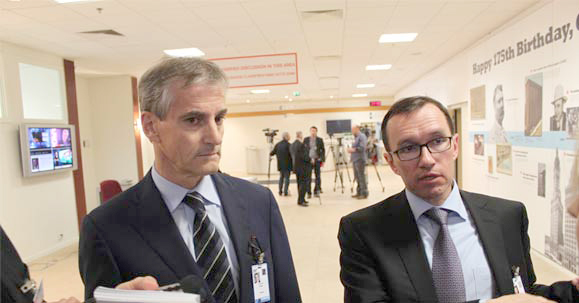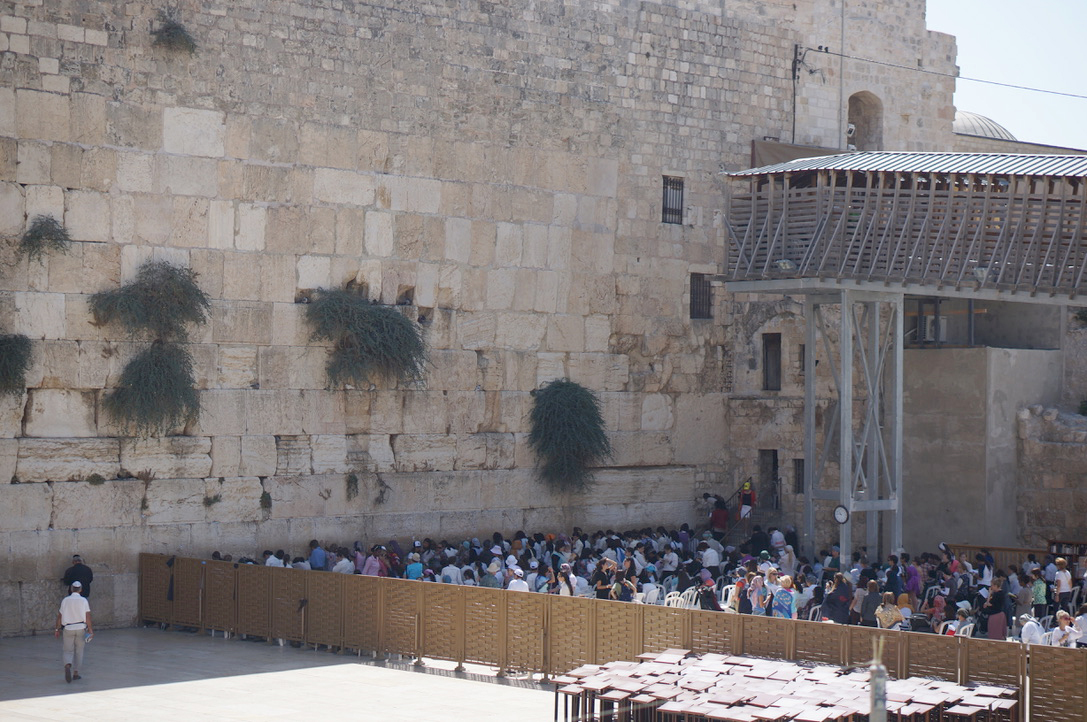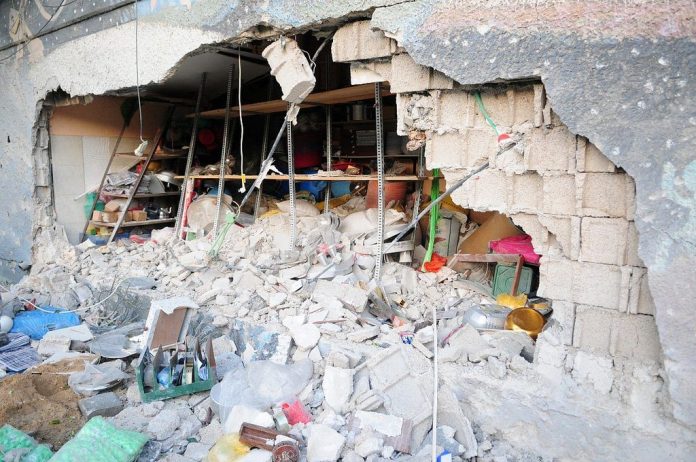Both Israel friends and the Palestinian Committee believe Espen Barth Eide is far more Israel-friendly than what Jonas Gahr Støre was. AUF leader Eskil Pedersen calls for clearer criticism of Israel.
(THIS ARTICLE IS MACHINE TRANSLATED by Google from Norwegian)
Conflict. When a bomb went off in a bus in Tel Aviv 21. November, the Foreign Ministry was quick to post a condemnation on its website, under the title "Bomb against the bus in Israel":
This was the second press release Eide had sent out about the Gaza war in a week. The other was from 16. November and had the title "Norway concerned about civilian casualties in Gaza and Israel".
The Foreign Ministry points out in its 21.11 message that no one was killed but that the bomb "injured at least 21 people":
"- I would like to express my deepest condolences to those affected and their families," the Foreign Minister said.
Facsimile: New Time November 23st.
"Operation Defense Column" was the name of the Israeli attack on the Gaza Strip, which according to Wednesday's peace treaty is said to have lasted from November 14 to 21. The bombing of the densely populated land strip started on Wednesday, November 14, following the targeted killing of Hamas military deputy leader Ahmed al-Jabari (51). More than 130 Palestinians and five Israelis have been killed since the attacks began. Among them women, children and the elderly. Wednesday's bomb in Tel Aviv was the first attack in the city since April 2006.

Eide vs Støre
"If you are considered biased, it weakens your chances of creating peace." This is what former Secretary General of the UN, Kofi Annan, said about the situation in the Middle East – when he was in Norway this week. Despite Annan's warnings, it is precisely bias that Norway's new foreign minister will be both accused and applauded for this week. From both sides of the Israel-Palestine debate come the analyzes that Norway's rhetoric has changed.
"These are new and gratifying tones from the Ministry of Foreign Affairs," writes Med Israel For Fred (MIFF) in a press release sent to Norwegian newspaper editors. "It is noticeable that Norway has a foreign minister who has a background in the Ministry of Defense, and who knows the international law of war," says the leader of MIFF, Conrad Myrland.
From the opposite end of the debate, the Palestinian Committee has the same analysis, but is dissatisfied. Gada Azam, chair of the Palestinian Committee in Oslo, says in Monday's edition of Dagsavisen that «Foreign Minister Espen Barth Eide has gone out into the media and said that Israel has the right to defend itself. Jonas Gahr Støre was more balanced and diplomatic when he was Minister of Foreign Affairs. Barth Eide has taken the side. "

It may thus seem as if the Norwegian language and rhetoric has changed. But why did that happen in that case?
- In my statements, I have conveyed Norwegian attitudes based on the current situation and the way we in the Ministry of Foreign Affairs have analyzed the course of events, says Foreign Minister Barth Eide to Ny Tid.
He does not want to answer what he thinks about the MIFF's and the Palestinian Committee's analysis of his more positive attitudes towards Israel. He also does not want to answer what separates Norway's line from Barack Obama's and the United States' line.
- Against too much power
But let's look at what Støre said in December 2008 against what Eide says now in November 2012:
"At the same time as we recognize Israel's right to self-defense, we recall that Israel as a state is obliged under international law to limit military countermeasures to what can be considered defensive acts, and not to resort to collective punishment. In addition, the distinction between combatants and non-combatants must be respected so that civilian casualties are avoided. Disproportionate use of force that goes beyond self-defense is unacceptable. Gaza is one of the most densely populated areas in the world, and the risk of innocent lives being lost or civilians being injured is high. "
This is stated by Foreign Minister Barth Eide in a press release on 16 November 2012. Here are some of what Støre stated during the first Gaza war in 2008-09:
"The Israeli ground operation in Gaza is a dramatic escalation of the conflict. Norway strongly dissociates itself from a war that causes great civilian suffering and asks that the troops be withdrawn immediately. "
And:
"Continued bombing raids on the densely populated Gaza Strip and now full military ground operations hit a civilian population that cannot defend itself and cannot flee. "Gaza is the world's most densely populated area and the effects of a ground invasion will be very serious for a civilian population that has already been severely tested through many years of strict closure and now many days of hostilities," he said.
- Logical difference

Senior adviser at the International Law and Policy Institute (ILPI) and Middle East expert Cecilie Hellestveit tells Ny Tid that it is the situation, and not the person, that makes the Norwegian language use different today than four years ago.
- Yes, there is a difference in the use of language, but it is also very natural that it has changed, says Hellestveit.
- Why is it a natural change?
- Because the situation in today's conflict is completely different than it was during the war four years ago. There is a tendency among all the countries behind the Middle East Quartet's work to have a new and more understanding approach to Israel.
- Are there other reasons than the new regional and international situation for the change in language use?
- Yes, Israel is behaving differently now than it did in 2008. They operate militarily much more narrowly. They primarily take out military infrastructure, and they largely stay away from civilians. In addition, they let journalists into Gaza and show openness. The changes in rhetoric must also be seen in connection with this.
- How has the civil war in Syria affected Norway's and other countries' attitudes?
- The past week's events in Syria, with the Gulf countries, Turkey and the West's gradual recognition of the new Transitional Council, have helped raise tensions throughout the region. Here, Norway can be implicated as a NATO country, and there is good reason to tread carefully.
- How important are the personal differences between Barth Eide and Støre in this case?
- It is minimally important. I think Barth Eide would have said the same thing that Støre said four years ago, and Støre would have said the same thing that Barth Eide says now, if he was still Foreign Minister.
- But the difference in language use is there?
- Yes, but the changes can be explained by the situation. It is therefore not illogical that the rhetoric has changed and it has nothing to do with the difference between the two ministers, Hellestveit concludes.
Dialog man

Frank Aarebrot is Professor of Comparative Politics at the University of Bergen. He is also a member of the Labor Party and is listed as a Palestine expert at UiB's website. He, for his part, agrees with his Israeli and Palestinian friends that the two foreign ministers have different approaches to the Israel-Palestine conflict.
Aarebrot believes there are two ways to analyze the situation in the Middle East. One is to focus on the asymmetric relationship in the loss of human life. The second is to focus on Israel responding as a consequence of an increased frequency of rocket attacks from the Gaza Strip.
- Barth Eide focuses on the frequency of rocket attacks, where Støre in his time focused on the asymmetric loss figures. Støre talked about structural violence and dialogue, while Barth Eide talks about the frequency, says Aarebrot. He says that he personally thinks it is right of Barth Eide to show understanding towards Israel.
-
If Israel does not gain understanding from the outside world, they may want to go to ground invasion. It must not happen, by all means, so it is important that Barth Eide says what he now says. Barth Eide is thus more crisis-conscious than Støre was. Dialogue is nice to talk about during lectures at schools, but can quickly become theoretical in the face of realpolitik, says Aarebrot.
Barth Eide's perspective

Espen Barth Eide did not want to answer what he thinks about the difference between himself and his former boss, Jonas Gahr Støre. However, what Barth Eide wants to answer to Ny Tid is Norway's general line towards what is now happening in Israel and Palestine:
- I am very concerned about the civilian casualties and damage reported from Gaza and southern Israel following the recent days of violence. The escalation of violence is disturbing. No one has benefited from a new war in Gaza, says Barth Eide.
He believes that a great responsibility rests on all parties in stopping warfare in the future. -
Israel has the right to defend its own country and population, but this is not a blank power of attorney. Any defense measures should be directed only at the direct threat and do not imply any right to collective punishment of the people of Gaza. In addition, the humanitarian law's principles of proportionality and the distinction between combatants and civilians must be respected.
Ny Tid also calls Iver B. Neumann, a political scientist and anthropologist with expertise in diplomacy. He is currently in London and has not seen any changes. He does not think there can be much difference between them.
- I've known Barth Eide for 30 years. It would be very surprising from these two if they would say different things. But in general, potential nuances in language use are extremely important in such situations, says Neumann. ■
This is the introduction to the main issue in the weekly magazine Ny Tid's issue 23.11.2012. Read more in this week's issue, on sale in stores across the country. Get the edition sent for free by subscribing (Abo@nytid.no)or click here.


